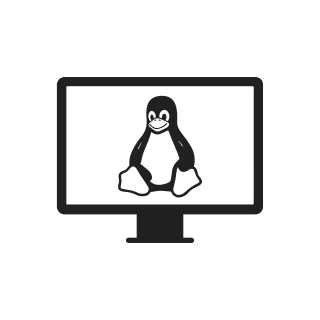This Linux course serves as a comprehensive practical guide to operating the Linux operating system, covering everything you need to know to work with this operating system. The techniques and tools required to maximize the potential of Linux are presented in a highly professional manner, delivered by experienced engineers with decades of industry experience.
This Linux course has been successfully delivered to thousands of participants, including hundreds of well-known tech companies in the industry.
The course is designed for both beginners and advanced learners and is divided as follows:
- Linux Fundamentals — Starts with Linux installation (usually Ubuntu and CentOS distributions), usage of command-line commands such as file and directory management in Linux (Linux File System), user permissions (Linux file system permissions), system management, and more.
- Linux Administration — User configuration, network card setup and communication configuration (setting up and configuring networking), working with programs/processes and threads (Linux processes and threads), managing the Linux kernel, driver installation, Linux boot loader stages, and more (see content list below).
What is Linux?
Linux is an open-source operating system that is widely used across industries. As a development company providing development and support services to tech companies, we have crafted an up-to-date and practical learning program that places a strong emphasis on hands-on exercises and practical experience.
Linux is an operating system that operates on open-source code, making it free and open for use. It serves as a platform for a wide range of computing systems, supports various hardware installations and numerous I/O capabilities, enabling efficient, stable, flexible, and secure usage. Nowadays, Linux can be found almost everywhere: on servers, PCs, embedded computer systems (Embedded Linux), smartphones, tablets, and more.
The Linux operating system is derived from Unix. During the initial stages of Unix's development, there were no standardized guidelines, nor were there established licenses. Given the relatively new field of software, various versions and development approaches of Unix contributed to the tech industry. During this time, Linux Torvalds, a student at the University of Helsinki, adapted Unix's source code (which primarily served university servers and commercial companies) to his own version, making it suitable for PCs and creating the Linux kernel.
In conjunction with another open-source project called GNU, Linux was established as a free version with a specific license that limits users to free usage. In other words, distributing different versions of the same Linux without significant changes to the development was prohibited. Over the past decade, the "open-source" movement has gained momentum, and companies began adapting Linux for embedded computer systems. This allowed Linux to be adapted for various hardware architectures, such as ARM, MIPS, and PQUICC.
Today, the Linux system supports a wide range of services, both at the hardware and software levels. Linux can be found in various forms, whether it's Red Hat, which has shifted its usage to commercial servers, platforms for smartphones (Google's Android), real-time systems (as an alternative to expensive VxWorks systems), or as a general-purpose operating system on unique boards developed by various manufacturers.
Who is the Linux course for?
Linux has become a de facto standard, and we see its presence in every aspect of the tech world. Learning Linux Admin serves as a foundation and opens up numerous (sometimes essential) opportunities for further specialization and career development in various domains within the tech industry, such as:
- Software Testing
- Automation Tool Development
- Cybersecurity
- DevOps and more
- Embedded Systems Development
- Full Stack Systems Development
- Machine Learning & AI Systems Development
This Linux course focuses on managing Linux-based operating systems and provides all the necessary knowledge to work within a Linux operating system. It aims to understand and manage the operation of the Linux operating system efficiently in various domains.

Linux Studies — Leaping into the World of Tech
The Linux operating system offers significant advantages over other operating systems. Some of the key benefits of Linux include:
- Open Source Code
- High Security
- Large Community
- Frequent Feature Updates
- Freedom of Operation and more
Due to these advantages, numerous companies worldwide utilize Linux, consequently creating a demand for Linux Admin professionals who can effectively manage the system to perform installations, configurations, bug tracking, permission management, and a wide variety of important and essential tasks.
A Linux expert has the option to directly work for leading companies in the industry as a Linux server administrator. Alternatively, they can choose to continue their studies in information security or other areas. Alternatively, they can embark on paths such as software testing, automation development, and DevOps.
All these domains are highly developed in the tech industry, and the Linux operating system plays a crucial role in them. Graduates of Linux studies possess the advantage of experience and broad knowledge, which facilitates smoother and faster integration into these domains.
Throughout the Linux studies program at Real Time College, we cover numerous important topics related to operating system operations as needed. We delve into various subjects including Linux concepts, installation, Linux commands, file system structure, graphics with Linux, permission and user management, security, and more.
In the second part of the studies, dedicated to Bash Scripting, we delve into learning shell scripting, commands, filters, understanding processes and their importance, working with loops in the shell, and more.
All these topics and many more prepare the Linux professional to perform numerous tasks within the industry, igniting their passion for professional knowledge and a tech career.
This Linux course is also taught as part of a comprehensive QA and Automation Development course track.
Leave your details on one of the forms of the page, and our representatives will get back to you promptly!
Who is the Linux Admin course for?
- The Linux Course is designed for individuals with no background in the Linux operating system who are interested in entering and establishing themselves in the world of tech.
- Linux studies serve as a foundation for courses in software development within this operating system.
- The course also serves as preparation for those interested in taking the international LPI certification exams.
Linux Admin Course Prerequisites
- Basic computer skills.
The Linux Admin Course includes:
- Learning Linux with exercises and solutions.
- Classroom exercises accompanied by explanations, homework assignments, and solutions on the course website.
- Course booklet.
- Videos and presentations on the course website.
- Towards the end of the course, each student will complete a practical project that summarizes the acquired knowledge during the course.
- Lectures are held once a week in the evenings or mornings.
This Linux course is a practical program that comprises interactive lectures and hands-on exercises.













